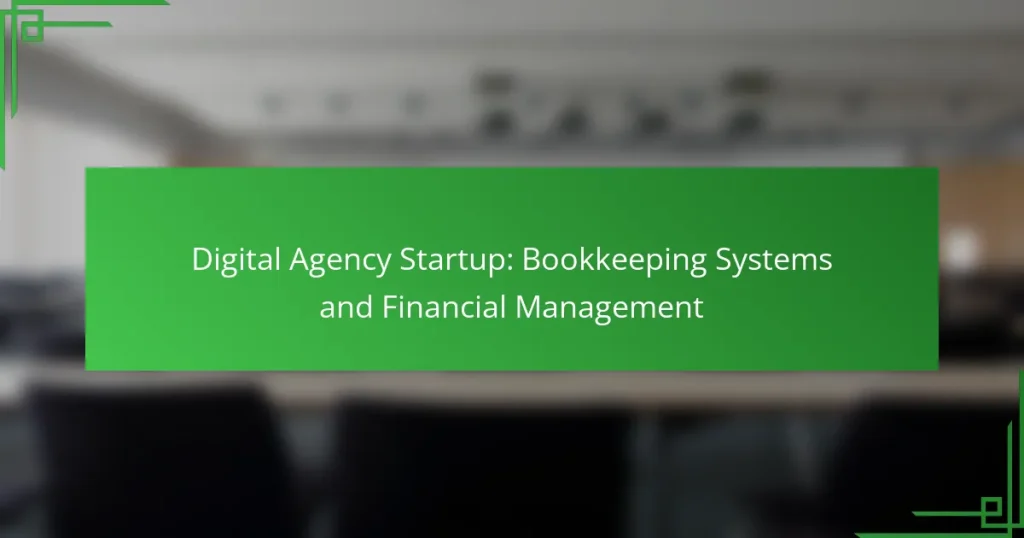Starting a digital agency requires a solid understanding of financial management to ensure long-term success. Key practices such as budgeting, cash flow management, and expense tracking are essential for maintaining profitability in a competitive landscape. By leveraging the right tools and strategies, agencies can streamline their financial processes and plan for sustainable growth.
Digital Agency Startup: Tax Compliance, Financial Forecasting and Expense Tracking
Digital Agency Startup: Financial Forecasting, Expense Tracking and Bookkeeping Systems
Digital Agency Startup: Pricing Strategies, Tax Compliance and Financial Forecasting
Digital Agency Startup: Expense Tracking Tools and Bookkeeping Systems
Digital Agency Startup: Bookkeeping Systems and Financial Management
Digital Agency Startup: Budgeting Tips, Cash Flow Management and Pricing Strategies
What Are the Key Financial Management Practices for Digital Agencies?
Key financial management practices for digital agencies include budgeting, cash flow management, expense tracking, profit margin analysis, and financial reporting. These practices help ensure that agencies maintain profitability and sustainability in a competitive market.
Budgeting and Forecasting
Budgeting and forecasting are essential for digital agencies to allocate resources effectively and predict future financial performance. A well-structured budget outlines expected revenues and expenses, allowing agencies to plan for various scenarios.
Agencies should regularly review and adjust their budgets based on actual performance and market conditions. Utilizing software tools can streamline this process, making it easier to track changes and update forecasts as needed.
Cash Flow Management
Effective cash flow management ensures that digital agencies have enough liquidity to meet their obligations. Monitoring cash inflows and outflows helps identify potential shortfalls before they become critical issues.
Agencies can improve cash flow by invoicing promptly, offering discounts for early payments, and managing payment terms with clients. Establishing a cash reserve can also provide a buffer during lean periods.
Expense Tracking
Expense tracking is vital for understanding where money is being spent and identifying areas for cost reduction. Digital agencies should categorize expenses to gain insights into operational efficiency and profitability.
Using expense management software can simplify tracking and reporting, allowing agencies to monitor spending in real-time. Regular audits of expenses can help uncover unnecessary costs and promote better financial discipline.
Profit Margin Analysis
Profit margin analysis helps digital agencies assess their profitability by comparing revenues to costs. Understanding profit margins for different services or projects can guide pricing strategies and resource allocation.
Agencies should aim for healthy profit margins, typically ranging from 15% to 30%, depending on the service type. Regularly analyzing margins can highlight underperforming areas that may need reevaluation or adjustment.
Financial Reporting
Financial reporting provides a comprehensive view of an agency’s financial health. Regular reports, such as income statements and balance sheets, help stakeholders make informed decisions based on accurate data.
Agencies should establish a routine for generating financial reports, ideally monthly or quarterly. This practice not only aids in tracking performance but also prepares agencies for potential audits or investor inquiries.
How to Create a Budget for a Digital Agency Startup?
Creating a budget for a digital agency startup involves outlining your expected income and expenses to ensure financial stability. A well-structured budget helps you allocate resources effectively and plan for growth.
Identify Fixed and Variable Costs
Fixed costs are expenses that remain constant regardless of your agency’s output, such as rent, salaries, and software subscriptions. Variable costs fluctuate based on your business activities, including project-specific expenses like freelance fees and marketing costs.
To manage your budget effectively, list all fixed costs first, then estimate variable costs based on past projects or industry averages. This distinction helps you understand your baseline expenses and adjust your budget as needed.
Set Revenue Goals
Setting revenue goals is crucial for a digital agency startup to measure success and guide financial planning. Consider factors like market demand, pricing strategies, and client acquisition rates when establishing these goals.
Aim for realistic revenue targets based on your capacity and market conditions. For instance, a new agency might target monthly revenue in the low thousands of USD, gradually increasing as you build a client base and reputation.
Allocate Resources Effectively
Effective resource allocation ensures that your budget aligns with your agency’s priorities and growth objectives. Identify key areas where investment is necessary, such as talent acquisition, marketing, and technology.
Regularly review your budget to adjust allocations based on performance and changing market conditions. For example, if a particular marketing channel yields high returns, consider reallocating funds from less effective strategies to maximize growth potential.
What Tools Can Help Manage Finances in a Digital Agency?
Effective financial management in a digital agency can be streamlined with the right tools. Utilizing software for accounting, budget tracking, and time tracking can enhance accuracy and efficiency in managing finances.
QuickBooks for Accounting
QuickBooks is a popular accounting software that helps digital agencies manage their finances by tracking income, expenses, and generating financial reports. It offers features like invoicing, payroll, and tax management, making it a comprehensive solution for financial oversight.
When using QuickBooks, ensure you regularly update your financial data and reconcile accounts monthly. This practice helps maintain accurate records and simplifies tax preparation. Consider leveraging its reporting features to gain insights into cash flow and profitability.
Trello for Budget Tracking
Trello is a flexible project management tool that can also be adapted for budget tracking in a digital agency. By creating boards for different projects, you can visually manage budgets, allocate resources, and track expenses in real-time.
To effectively use Trello for budget tracking, set up cards for each project with budget limits and actual expenses. Regularly update these cards to reflect current spending and use labels to categorize costs. This approach allows for quick adjustments and better financial control.
Harvest for Time Tracking
Harvest is a time tracking tool that enables digital agencies to monitor billable hours and project costs. By accurately tracking time spent on tasks, agencies can ensure they are billing clients appropriately and managing resources efficiently.
To maximize Harvest’s benefits, encourage team members to log their hours daily and categorize them by project. This practice not only helps in accurate billing but also provides insights into project profitability. Regularly review time reports to identify trends and adjust project estimates accordingly.
How to Optimize Cash Flow for a Digital Agency?
Optimizing cash flow for a digital agency involves managing incoming and outgoing funds efficiently to ensure liquidity. Key strategies include automating invoicing, negotiating favorable payment terms, and maintaining a cash reserve to handle fluctuations in revenue.
Implement Invoice Automation
Invoice automation streamlines the billing process, reducing the time between service delivery and payment receipt. By using software solutions, agencies can generate and send invoices automatically, track payments, and send reminders for overdue accounts.
Consider integrating invoicing tools with your project management software to ensure accuracy and timely billing. This can significantly decrease the administrative burden and improve cash flow predictability.
Negotiate Payment Terms
Negotiating payment terms with clients can greatly enhance cash flow. Aim for upfront payments or milestones that align with project phases, which can help mitigate the risk of delayed payments.
Common practices include requesting a deposit of 20-50% before starting work and setting clear timelines for remaining payments. This approach not only secures initial funding but also keeps clients accountable for timely payments.
Maintain a Cash Reserve
Maintaining a cash reserve is crucial for managing unexpected expenses or periods of low revenue. Aim to set aside three to six months’ worth of operating expenses to provide a buffer during lean times.
Regularly review your financial situation to adjust the reserve as necessary. This proactive measure can prevent cash flow crises and allow for strategic investments when opportunities arise.
What Are the Common Financial Mistakes Digital Agencies Make?
Digital agencies often fall into several financial traps that can jeopardize their sustainability. Key mistakes include underestimating expenses, ignoring tax obligations, and lacking thorough financial analysis.
Underestimating Expenses
Many digital agencies fail to accurately forecast their expenses, leading to cash flow issues. Common overlooked costs include software subscriptions, employee benefits, and marketing expenses. It’s crucial to create a detailed budget that accounts for both fixed and variable costs.
A practical approach is to categorize expenses into essential and discretionary. This helps prioritize spending and ensures that necessary costs are covered before allocating funds to non-essential items.
Ignoring Tax Obligations
Neglecting tax obligations can result in hefty fines and penalties for digital agencies. Agencies must understand their tax responsibilities, including income tax, sales tax, and payroll taxes. Setting aside a portion of revenue for taxes can prevent cash flow issues during tax season.
Consulting with a tax professional can provide clarity on local regulations and help identify potential deductions. Regularly reviewing tax obligations ensures compliance and minimizes surprises at year-end.
Lack of Financial Analysis
A failure to conduct regular financial analysis can hinder a digital agency’s growth. Without analyzing key performance indicators (KPIs) like profit margins and client acquisition costs, agencies may struggle to make informed decisions. Establishing a routine for financial reviews can highlight trends and areas for improvement.
Utilizing financial software can streamline this process by providing real-time insights into financial health. Regularly comparing actual performance against budgeted figures allows agencies to adjust strategies proactively and enhance profitability.
What Metrics Should Digital Agencies Track for Financial Health?
Digital agencies should track several key metrics to maintain financial health, including revenue growth, profit margins, and cash flow. Monitoring these metrics helps agencies make informed decisions and ensure long-term sustainability.
Revenue Growth
Revenue growth measures the increase in an agency’s income over a specific period. It’s essential to track this metric regularly, as it indicates the agency’s ability to attract and retain clients. Aim for a growth rate of 10-20% annually, depending on market conditions and agency maturity.
To effectively monitor revenue growth, compare current figures against previous years and set realistic targets. Consider seasonal fluctuations and industry trends that may impact income. Regularly reviewing these figures helps identify areas for improvement and potential opportunities.
Profit Margins
Profit margins reflect the percentage of revenue that remains after expenses are deducted. Maintaining healthy profit margins is crucial for financial stability. Aiming for a profit margin of 15-25% is generally considered healthy for digital agencies.
To improve profit margins, analyze costs and identify areas where expenses can be reduced without sacrificing quality. Regularly review pricing strategies to ensure services are competitively priced while still covering costs and generating profit.
Cash Flow
Cash flow refers to the movement of money in and out of the agency. Positive cash flow is vital for day-to-day operations and meeting financial obligations. Aim to maintain a cash reserve that covers at least three to six months of operating expenses.
To manage cash flow effectively, implement a robust invoicing system and follow up on overdue payments promptly. Consider offering discounts for early payments to encourage timely transactions. Regularly forecasting cash flow can help anticipate shortfalls and plan for future expenses.



